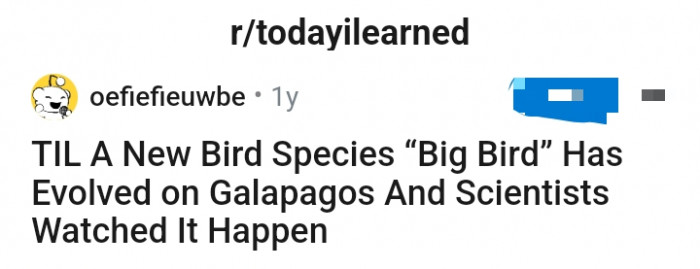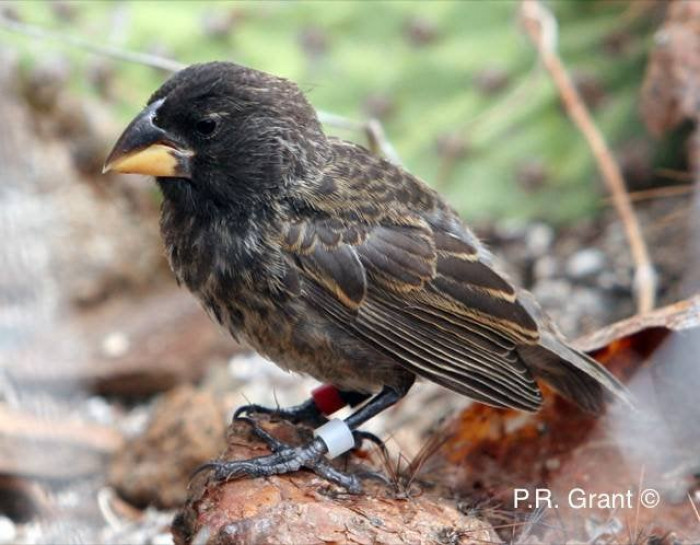Redditors Learn About A New Breed Of “Big Bird” Which Evolved On Galapagos And Scientists Observed As It Happened
A new study shows how new species can emerge in as few as two generations. The research followed Darwin's finches on the Galápagos island of Daphne Major, where a member of the G. conirostris species arrived from another island and interbred with a resident finch of the G. fortis species.
The offspring evolved into a new species known as the Big Bird lineage, according to the researchers. The research stems from work done on Darwin's finches, which live on the Pacific Ocean's Galápagos Islands.
Researchers have been able to study the evolution of biodiversity due to natural selection under pristine conditions, thanks to the remote location. The direct observation of the origin of this new species occurred during fieldwork conducted over the last four decades on the small island of Daphne Major by B. Rosemary Grant and Peter Grant, a husband-and-wife team of Princeton scientists.
When the size and shape of the Big Bird beaks are compared to the beak morphologies of the other three species that live on Daphne Major, it is clear that the Big Birds have their unique niche in the beak morphology space. Thus, the merging of gene variants contributed by the two interbreeding species, combined with natural selection, resulted in the evolution of competitive and unique beak morphology.
More Info: Reddit, princeton.edu
Meet Redditor u/oefiefieuwbe who has an interesting piece of information to share with the TodayILearned subreddit group

This Is The New Bird Species “Big Bird” Which Has Evolved on Galapagos

A graduate student working with the Grants on Daphne Major in 1981 became aware of the newcomer, a male with a particular song and a physique and beak size that were significantly greater than those of the three native species of birds on the island. Peter Grant, an emeritus professor of ecology and evolutionary biology and the Class of 1877 Professor of Zoology, said:
“We didn’t see him fly in from over the sea, but we noticed him shortly after he arrived. He was so different from the other birds that we knew he did not hatch from an egg on Daphne Major."
As usual, Redditors dropped their hot takes about the discovery, and we've gathered a bunch of their replies for you to read through below.
This Redditor is clearly short of words

Evolutionary Psychology of the Galapagos
Dr. Anna Pritchard, an evolutionary psychologist, highlights the unique evolutionary processes observed in the Galapagos Islands.
Research indicates that isolation can lead to rapid speciation, as seen with the new breed of 'Big Bird.'
This phenomenon illustrates natural selection's power and its role in shaping behaviors that are adapted to specific environments.
Understanding Evolutionary Adaptation
The emergence of a new breed of 'big bird' in the Galapagos Islands exemplifies the principles of evolutionary adaptation. Research in evolutionary biology has long documented how species evolve in response to environmental pressures, leading to unique traits and behaviors. According to studies published in the Journal of Evolutionary Biology, such instances highlight the dynamic nature of evolution and the adaptability of life.
This phenomenon can also be viewed through a psychological lens, where adaptation mirrors the human capacity for change and resilience. Psychologists argue that just as species adapt to their environments, humans can develop adaptive strategies to navigate life's challenges.
This Redditor read about them from a famous scientist and notorious Galapagos expert

What cats everywhere are going to be like

Too long has Big Bird lied to us about...

Furthermore, the concept of adaptive behavior helps explain how species evolve traits that enhance survival in isolation.
Psychological studies show that understanding these adaptive behaviors can foster a deeper appreciation for biodiversity and the importance of conservation.
Encouraging curiosity about these unique adaptations can inspire individuals to engage more actively in environmental stewardship.
Interestingly, the concept of 'selective pressure' in evolutionary biology can be paralleled with the pressures we face in our daily lives. Social psychologists have found that individuals often adapt their behaviors in response to social expectations or challenges. This adaptability is crucial for personal growth and success, as it allows individuals to thrive in varying circumstances. Dr. Sonja Lyubomirsky, a renowned happiness researcher, states, "The key to happiness is not just adapting to change, but actively embracing it." To foster adaptability, individuals can benefit from strategies such as embracing change and seeking feedback. Research indicates that those who actively seek constructive criticism are more likely to adjust their approaches and achieve their goals, as highlighted by Dr. Jonathan Haidt, a social psychologist, who emphasizes, "Feedback is a powerful tool for personal development" on his website jonathanhaidt.com.
Are we the eggs laid by hybrid eggs or big bird eggs?

According to this Redditor, no one has ever seen evolution

And this Redditor says that evolution is only a theory

Community Engagement Through Evolutionary Stories
Sharing stories about unique species can strengthen community ties and promote conservation efforts.
Research shows that narrative storytelling can enhance empathy and understanding of environmental issues.
When communities come together to discuss the remarkable adaptations of local wildlife, they foster a shared sense of identity and purpose.
The Role of Environment in Shaping Behavior
The Galapagos Islands serve as a living laboratory for studying the relationship between environment and behavior. Ecological psychology emphasizes that the environment plays a crucial role in shaping behaviors and interactions. Studies have shown that when species are placed in unique ecological contexts, they often develop distinct behaviors that enhance their survival.
This principle can be applied to human behavior as well. Research indicates that our environments can influence our choices, motivations, and even emotional states, highlighting the importance of creating supportive and enriching settings.
The Beak of the Finch by Jonathan Weiner

This Redditor is explaining the two different things

The majority of these lineages have gone extinct

Additionally, environmental psychologists emphasize the role of education in promoting awareness about biodiversity.
Studies suggest that educational initiatives focusing on local species can enhance community engagement and commitment to conservation.
By leveraging the stories of unique species, communities can inspire collective action to protect their environments.
To enhance our understanding of environmental influences on behavior, individuals can engage in reflective practices that promote awareness of their surroundings. Research in positive psychology suggests that mindfulness and self-reflection can lead to greater insight into how environments shape our experiences. By cultivating awareness, individuals can make more intentional choices that align with their values and goals.
Additionally, seeking opportunities to immerse oneself in diverse environments can foster adaptability and creativity. This aligns with findings from the Journal of Personality and Social Psychology, which emphasizes the benefits of exposure to varied contexts.
It is the big bird time

Other characters will end up just missing him

This new bird would be considered critically endangered

Practical Steps for Biodiversity Advocacy
Communities can organize educational workshops focused on local wildlife to foster a deeper understanding of evolutionary processes.
Incorporating hands-on activities, like species monitoring, can empower residents to actively participate in conservation efforts.
By creating opportunities for engagement, communities can cultivate a culture of stewardship that supports biodiversity.
Inspiring Change Through Observation
The study of the new breed of 'big bird' in the Galapagos also underscores the power of observation in driving change. Research in behavioral science indicates that observing successful adaptations can inspire individuals to adopt similar strategies in their own lives. This concept aligns with social learning theory, which posits that individuals learn by observing the behaviors of others.
To leverage this principle, communities can organize educational programs that highlight successful adaptations in nature. By showcasing these stories, we can inspire individuals to embrace change and innovation in their own lives, fostering a culture of adaptability and resilience.
Previously, researchers assumed that the formation of a new species takes a very long time. However, according to the Grants' field observations combined with genetic studies, it happened in just two generations in the "Big Bird" lineage.
What are your thoughts? Let us know in the comments below.
Psychological Analysis
This scenario reflects the dynamic nature of evolution and the importance of adaptability. Observing how species evolve in response to their environments can inspire us to embrace change in our own lives. By fostering a mindset of resilience and openness to new experiences, we can better navigate the complexities of our modern world.
Analysis generated by AI
Analysis & Alternative Approaches
In conclusion, the emergence of a new breed of bird in the Galapagos Islands serves as a powerful reminder of the adaptability of life. By understanding the principles of evolution and the role of environment in shaping behavior, we can draw parallels to our own lives. Cultivating adaptability and resilience will empower us to navigate the challenges we face in an ever-changing world.
Analysis & Alternative Approaches
Understanding the evolutionary processes at play in unique ecosystems can deepen our appreciation for biodiversity.
Research supports the notion that storytelling and education are powerful tools for fostering community engagement and conservation.
By sharing the stories of unique species, we can inspire collective action to protect our planet.



